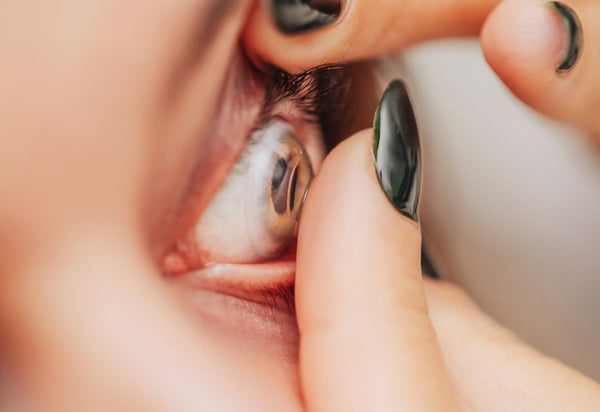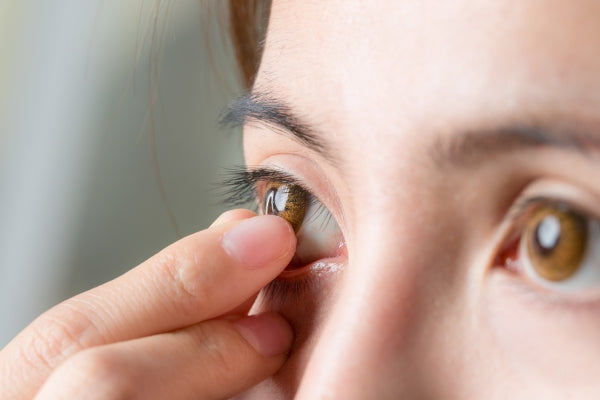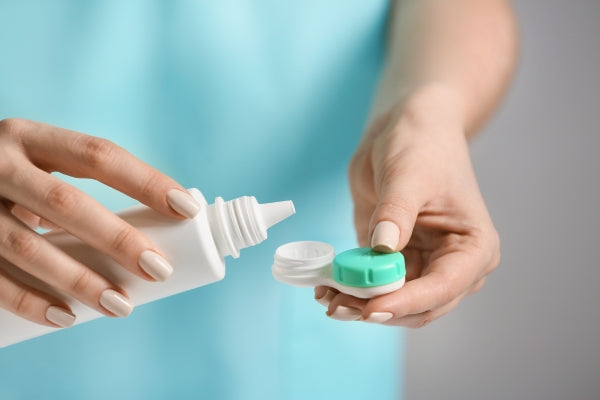How to put contact lenses in
Have you just gotten your first set of contact lenses? Or maybe it’s just been a while since you wore them and want a refresher on how to put them in? Knowing how to apply your contact lenses correctly is an important aspect to wearing them comfortably. Not only that, but it will also keep your eyes healthy and happy. There are multiple different ways of putting in contact lenses so if you’re looking for the easiest way to apply contact lenses, look no further.
Three ways to put contact lenses on
Putting in your contact lenses is a step-by-step process but once you’ve got those steps down, it becomes easier every time. Just make sure you have all your tools ready to go, you have clean hands, and you experiment with the different methods to find the best option for you.
Before putting your contact lenses in
There are three methods you can use when putting in contacts and we’ll go over each one in detail. Before you start, make sure you have gathered everything you need and are situated in front of a mirror – preferably with a table or counter space in front of you. If you’re nervous or unsure, a private or quiet space is ideal, just make sure your surface is clean.
Set everything out in front of you such as your lenses in their case and any solutions you need. Some types of lenses also require an application tool – make sure it’s clean and ready to use.
Next, wash your hands with warm water and soap. Wash for about 20 seconds to remove dust, dirt, and debris from your hands and nails. You may also want to file your nails before you begin to make sure they’re not too long and remove any rough edges. Dry your hands well using a lint-free cloth or by allowing them to air dry.
No matter which way you choose to apply your lenses, always check your lenses before you put them in:
Check that your lenses are still in date and not expired.
Ensure they have been stored correctly in the right storing solution and that they haven’t dried out between wears.
Check for any tears or visible scratches on the lens as these can be irritating on your eye, trap dirt, and disrupt your vision.
Make sure your lenses are the correct orientation. Sometimes they will have an indicator mark showing you which way is up.
Make sure your lenses aren’t inside out – an inside out lens will be uncomfortable and slip out of place – as it’s balanced on the pad of your finger, your lens should be completely concave. If it has a flare around the outer edge, it’s probably inside out.
You’re now ready to apply your lenses in one of three ways: front-on method, side method, or looking up method.
1. Front-on method
The front-on method is exactly what it sounds like – applying the lens directly to your eye straight on. It can be a little daunting at first as you will naturally want to blink your finger away but should become easier after some practise.
On the hand that is the same side as the eye you’re working on, place the lens on the tip of your index finger.
With your other hand, pull up the top eyelid. Try to hold it as centrally as possible and as close to the lash line as you can.
Using the middle finger of the hand holding the lens, hold your bottom lid along the lash line, apply light pressure and pull down to open your eye as much as possible.
Slowly bring the lens towards the centre of your eye, directly over your iris.
Once you feel the lens is in, close your eyes and move them from side to side to make sure your lens is in the right position and get rid of any air bubbles.
2. Side method
This method is ideal for those who are a bit squeamish and don’t like the idea of touching their eyes straight on. While the other methods can be done while sat down, you may find this method is easier when stood up.
Place your contact lens on the tip of the hand opposite the eye you’re working on.
Turn side on so that hand is closest to the mirror and look into the mirror.
Use your other hand to lift your upper eyelid and the middle finger of the one holding the lens hold your bottom lid along the lash line, apply light pressure and pull down.
Tilt your head slightly towards your shoulder so you’re looking towards your nose – this should expose a good amount of white at the side of your eye.
Place your contact on the white part of your eye. Blink and move your eyes around to help it settle into the right place and get rid of any air bubbles.
3. Looking Up method
This is a great beginner method or for those who are fairly new to contact lenses.
Start by setting up your lens on the tip of the index finger of the side that the eye belongs to.
Open your eyelids by using the middle finger of the same hand on your lower lid and your other hand on the top one.
Bring the lens close to your eye and make sure you have it lined up with your iris but don’t put it in just yet.
Before placing the lens on your eye, look towards the ceiling and apply the lens to the white part of your eye.
Blink a few times to allow the lens to slide into place and also remove any air bubbles.
Finding the easiest way to apply contact lenses is down to personal preference. Thankfully, if one method doesn’t suit you, there are other ways to put in your lenses so you don’t have to worry. But after you’ve put in your lenses for the first time, how do you get them out? Learn all about how to remove contact lenses as well as how to clean your contact lenses with our helpful and informative guides.
Book your contact lens consultation
find a Leighton branch near you
Learn more









